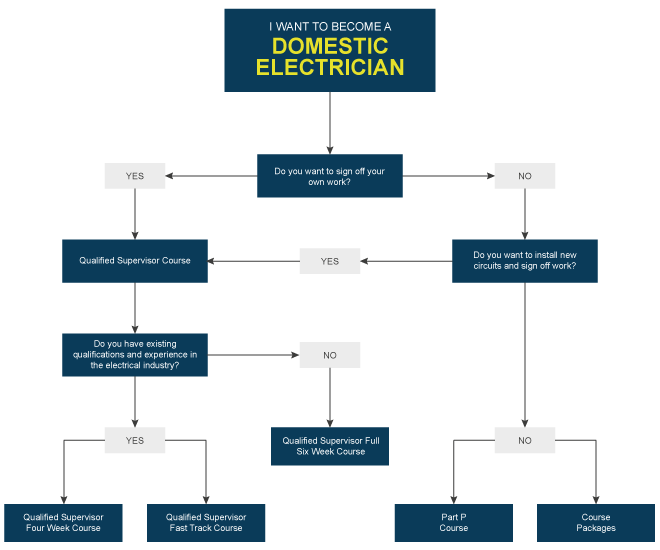What Career Routes Are Available For Domestic/Electrical Installers?
Electrical Industry Career Routes

It can be difficult to make that decision to change your career. There’s so much to consider and with existing responsibilities it can seem a daunting prospect.
However, it doesn’t have to be as difficult as it seems. With electrical training courses from PASS Training and Development you can change your career and start a new life without having to take considerable time off work and can study at times convenient for you and your lifestyle.
Once you have made the decision to start a new career in the electrical industry, it’s simply a matter of deciding which career route is best for your needs and ambitions.
Here we can help you again, with our easy to work through guide to the different electrical career options and what each route provides.
Follow the simple headings below for information on the different options to help you decide which career route is best for you.
![]()
Electrical Industry

The electrical industry is a fantastic and thriving industry with many new and innovative aspects and branches appearing all the time to make the role of the electrician an interesting and diverse one.
There are still many more people choosing university rather than skilled trades such as electrician, however despite this, there is a great need for skilled tradesmen and the electrical industry has, in recent years, suffered from a lack of skilled workers available.
This means that those who do make the change and get into the industry are in huge demand with some having difficulty keeping up with the work on offer.
By choosing to enter the electrical industry and making it your new career path, you will be helping to bridge this skills gap and providing valuable services to those in need.
![]()
Why Choose Us

PASS Training and Development are specialists in the electrical industry and have been training and providing customers with electrical equipment for over 10 years.
With a dedicated team of staff, PASS can take you through all aspects of your electrical industry transition, from recommending courses which suit your individual needs through to providing electrical tools and equipment so you can begin your working life.
We are endorsed by many of the major electrical training bodies and equipment manufacturers, and our dedicated training facility not only provides a great learning environment but has been purpose built for the needs of electrical trainees.
For more information on us and what we can do for you, contact us on 01642 987 978.
Course Packages vs Qualified Supervisor
The two most popular and recognised routes into the electrical industry are through the study of the course packages and the Qualified Supervisor qualification.
Which you choose will depend on your career plans and ambitions, and what type of role you want to do.
The course packages are split into two different packages, which consist of a series of courses taking learners from beginner to qualified via these sets of electrical courses. If you decide that course packages are for you, you will then need to decide whether you want to study the Domestic Electrical Installer course package or the Advanced Electrical Installer package.
The main difference between the two is that the advanced package has a few more specialist courses than the Domestic Electrical Installer version.
The Qualified Supervisor course is an NVQ qualification for those who would like to self-certify their own electrical work. This means that anyone holding this qualification will be able to sign off their work as up to regulation standards and won’t need to get a third party to do this for them.
![]()
How to Decide
To help you identify which career route is best for your needs, we have come up with a flow chart to help you navigate the different course options.

Role Scenarios
Here are a few role scenarios to give you an idea of how different courses are suitable for different people.
Q. “I want to carry out work on an ad-hoc basis and have a Qualified Supervisor sign off my work, which course is best for me?”
A. One of the course packages or the current Part P course would be ideal for the person in this situation.
Q. “I want to work as a Domestic Electrical Installer for a company who already has a Qualified Supervisor, which course is best for me?”
A. One of the course packages would be ideal for this role as the Qualified Supervisor in this situation would be able to sign off any work.
Q. “I have no electrical experience but want to be able to sign off any work myself, which course is best for me?”
A. In this situation the best course would be the full six week Qualified Supervisor course as this person wants to be able to sign off their work and they have no prior experience.
Q. “I have previous experience and/or qualifications in the electrical industry but still want to be able to sign off my own work, which course is best for me?”
A. This person may be able to study the Qualified Supervisor four week course depending on providing proof of their experience and qualifications.
Q. “I have more than two years experience and qualifications in the industry, I want to sign off electrical work myself, which course is best for me?”
A. This person may be entitled to do the Qualified Supervisor Fast Track version as they have experience and qualifications which may mean they do not need to study the course in full. This is however dependent on providing proof.
![]()
Things to Consider
Competent Person Schemes
If you hold the Qualified Supervisor qualification you will be able to register on a competent person scheme with any of the main bodies providing this service.
However, only some of these bodies accept the qualifications provided in the course packages to their competent person schemes. If you definitely want to self-certify your own work, it would be worth considering studying the Qualified Supervisor course, although it may be possible to register with some of these bodies with the course packages.
To be certain of which schemes accept which qualifications, it is best to check with the providers of these schemes directly as to their current guidelines on who can be a competent person and who cannot but as a general guide, we would advise those definitely wanting to sign off their own work to study the Qualified Supervisor course.







